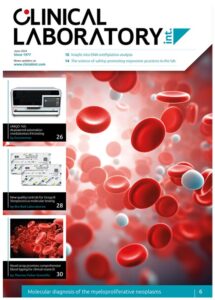Neogap’s patented technology behind groundbreaking MS research
Antibodies against Epstein-Barr virus (EBV), a common virus that most people acquire early in life, are linked to multiple sclerosis (MS). This is shown in a study from the Karolinska Institutet, where technology from the biotech company Neogap Therapeutics has been used to map immune cells reactive to EBV and autoantigens related to MS.
Using Neogap’s patented EpiTCer® technology, researchers at the Karolinska Institutet have obtained evidence of how antibodies or T cell responses to the Epstein-Barr virus (EBV) and a specific protein in our central nervous system are more common in patients with multiple sclerosis (MS). The study, published in the renowned research journal Science Advances, demonstrates that the immune response to a specific protein in EBV can inadvertently target a protein in the central nervous system of certain individuals, potentially triggering or expediting the development of MS.
The news has garnered immense attention in media outlets worldwide, including The Guardian, ABC Australia Radio and India Weekly.
“The study provides a crucial puzzle piece that helps explain why certain individuals develop the disease and how specific antibodies against the Epstein-Barr virus, which normally fight the infection, can mistakenly target the brain and spinal cord, causing damage,” says Olivia Thomas, a researcher at the Department of Clinical Neuroscience, Karolinska Institutet, and co-first author of the study alongside Mattias Bronge.
Olivia Thomas is part of Associate Professor Hans Grönlund’s research group. Hans Grönlund is the CSO and founder of Neogap Therapeutics.
“This is a remarkable breakthrough with great significance in the field of multiple sclerosis research and for potential future treatments. It also serves as further evidence of how Neogap’s patented EpiTCer® technology can be applied in pioneering research,” says Hans Grönlund.
The EpiTCer® technology, developed by Hans Grönlund, has proven groundbreaking in detecting rare antigen-specific, autoreactive T-cells with high sensitivity. In collaboration with researchers at Karolinska Institutet, several articles have been published describing the use of EpiTCer® particles for this purpose. Recently, a study was featured in Science Advances, unveiling the discovery of four novel autoantigens associated with multiple sclerosis. These findings demonstrate the potential clinical significance of the EpiTCer® technology and its ability to contribute to our understanding of autoimmune diseases like multiple sclerosis.
“We are delighted, not only because the acquired knowledge can be harnessed to develop personalised therapies for the lifelong suffering associated with multiple sclerosis, but also because we have obtained additional evidence that our technology platform holds substantial relevance across multiple disease fields, encompassing autoimmune disorders and other immune-related conditions. We are committed to advancing pioneering applications for EpiTCer® and making significant contributions to developing novel therapies for treating severe illnesses,” states Samuel Svensson, CEO of Neogap




